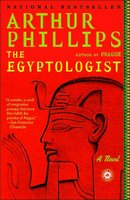 If you've been disappointed since July when the Hatshepsut exhibit left the Met, then go buy The Egyptologist by Arthur Phillips to infuse a little Egypt into this early fall.
If you've been disappointed since July when the Hatshepsut exhibit left the Met, then go buy The Egyptologist by Arthur Phillips to infuse a little Egypt into this early fall.The review that I agree with most is from The New Yorker (via bn.com):
This witty second novel plays with fire—“Pale Fire,” that is—by daring to appropriate the scheme of Nabokov’s cleverest novel. In both books, a deranged scholar, laying out a putatively brilliant yet comically improbable thesis, gradually reveals his own bitterness and delusions of grandeur. It’s immediately obvious that Ralph M. Trilipush—an obscure Egyptologist who claims to have discovered the tomb of an unknown yet visionary Pharaoh—is off his rocker. The fun comes in the way his megalomania mirrors the temperament of supposedly levelheaded scholars. (He engages in hilariously pedantic combat with the man who found King Tut’s tomb.) Phillips is nearly as deft as Nabokov at parodying the academic mind, and understands that his work must transcend mere homage. Unfortunately, he tricks up his plot by adding a dull detective who labors to expose Trilipush’s lies, and by stealing a twist from “The Talented Mr. Ripley.” The result is pastiche overload.The Egyptologist came out a little while ago and though I bought it right as it appeared in paperback, I think I've started it about seven times before this final push was made, the result being that I found it to be a little too long (but we all read Prague and therefore, we were expecting that) and it could have used a great deal more editing (perhaps like this sentence). The enjoyment, however, comes from the deliciously dreadful narrator and Phillips' deft use of the epistolary/journal format. Rather than being shocked at the ultimate conclusion, you feel as though you're aware of what's going on long before they've given you anything to prove it and you simply must watch the events maddeningly unfold. I found Phillips' small explanation of how to write a novel about a topic of which you're completely ignorant to be rather amusing and evidently he relied heavily on the staff of the British Museum who patiently answered his often bizarre questions (such as "what would the hieroglyphs for 'Atum-is-aroused' look like?").
No comments:
Post a Comment